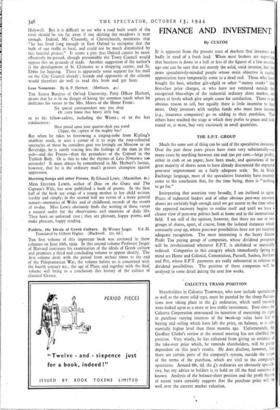FINANCE AND INVESTMENT
By CUSTOS
IT is apparent from the present state of tharkets that investors are badly in need of a fresh lead. When most brokers are reporting that business is down to a half or less of the figures of a few months ago one can be sure that not merely the solid, staid investor, but the more speculatively-minded people whose main objective is capital appreciation have temporarily come to a dead end. Those who have bought the best, whether gilt-edgEd or other " money stocks" like first-class prior charges, or who have not ventured outside t':.• recognised blue-chips of the industrial ordinary share market, s.% prices at levels which give ample cause for satisfaction. There is obvious reason to sell, but equally there is little incentive to bu, more. Only investors with surplus funds who must have income (e.g., insurance companies) go on adding to their portfolios. The others have reached the stage at which they prefer to pause and lo); round or, at most, buy very cautiously in small quantities.
THE E.P.T. GROUP Much the same sort of thing can be said of the speculative investors. Over the past three years prices have risen very substantially—in many cases by anything between ioo and 30o per cent.—large profits, either in cash or on paper, have been made, and quotations of the great majority of shares seem to have already discounted the expected post-war improvement on a fairly adequate scale. So, in Stock Exchange language, most of the speculative fraternity have recently come to the conclusion that, for the time being, there is " nothing to go for."
Interpreting that assertion very broadly, I am inclined to agree. Prices of inglustrial leaders and of other obvious post-war recovery shares are certainly high enough until we get nearer to the time when the expected recovery begins to realise itself and until we have a clearer view of post-war politics both at home and in the international field. I am still of the opinion, however, that there are one or two groups of shares, apart, of course, from the isolated instances which constantly crop up, whose post-war possibilities have not yet received adequate recognition. The most interesting is the heavy Excess Profit Tax paying group of companies, whose dividend prospects will be revolutionised whenever E.P.T. is abolished or materially reduced. Companies in this category which immediately spring to mind are Home and Colonial, Cementation, Purnell, Sanbra, Stothart and Pitt, whose E.P.T. payments are really substantial in relation to dividend possibilities. The position of these companies will be analysed in some detail during the next few weeks.
CALCUTTA TRAMS POSITION
Shareholders in Calcutta Tramways, who now include speculators as well as the more solid type, must be puzzled by the sharp fluctua- tions now taking place in the Li ordinaries, which until recently were looked upon as a more or less stable investment. Ever since the Calcutta Corporation announced its intention of exercising its right to purchase varying interests of the break-up value have led to buying and selling which have left the price, on balance, at a sub- stantially higher level than three months ago. Unfortunately, Sir Geoffrey Clarke's review at the annual meeting has not clarified the position. Very wisely, he has refrained from giving an estimate of the take-over price which, he reminds shareholders, will be partly dependent on this year's results: He does disclose, however, that there are certain parts of the company's system, outside the scope of the terms of the purchase, which are vital to the company's operations. Around 68s. 4d. the Li ordinaries are obviously speculd- tive, but my advice to holders is to hold on till the final outcome is known. Analysis of the balance-sheet position and the profit figures of recent years certainly suggests that the purchase price will be well over the current market valuation.


























 Previous page
Previous page